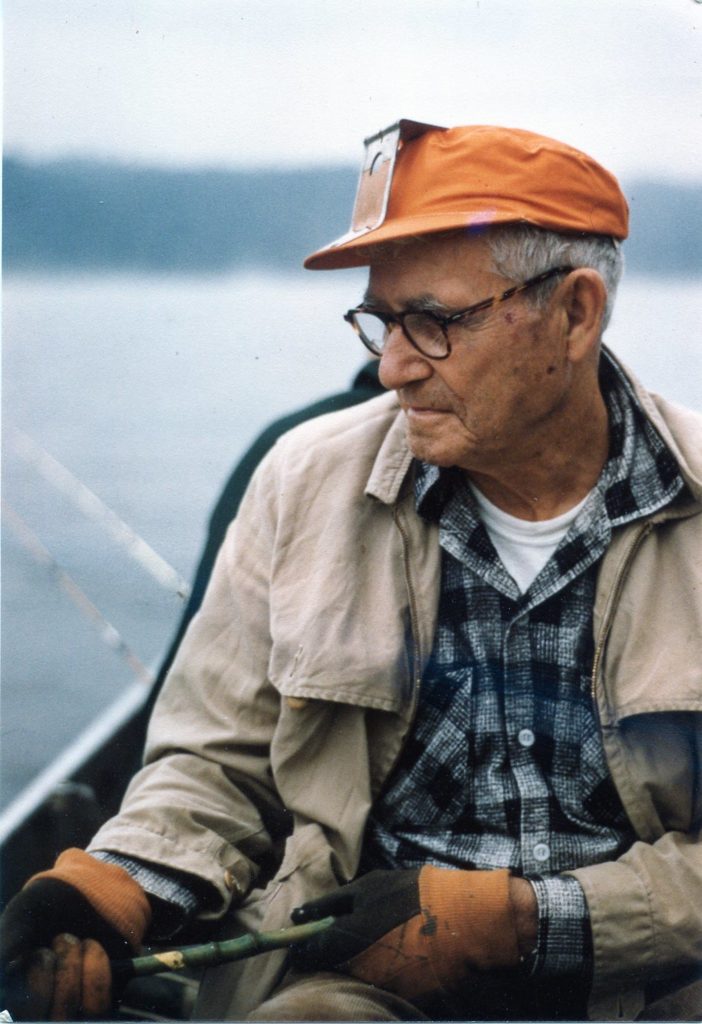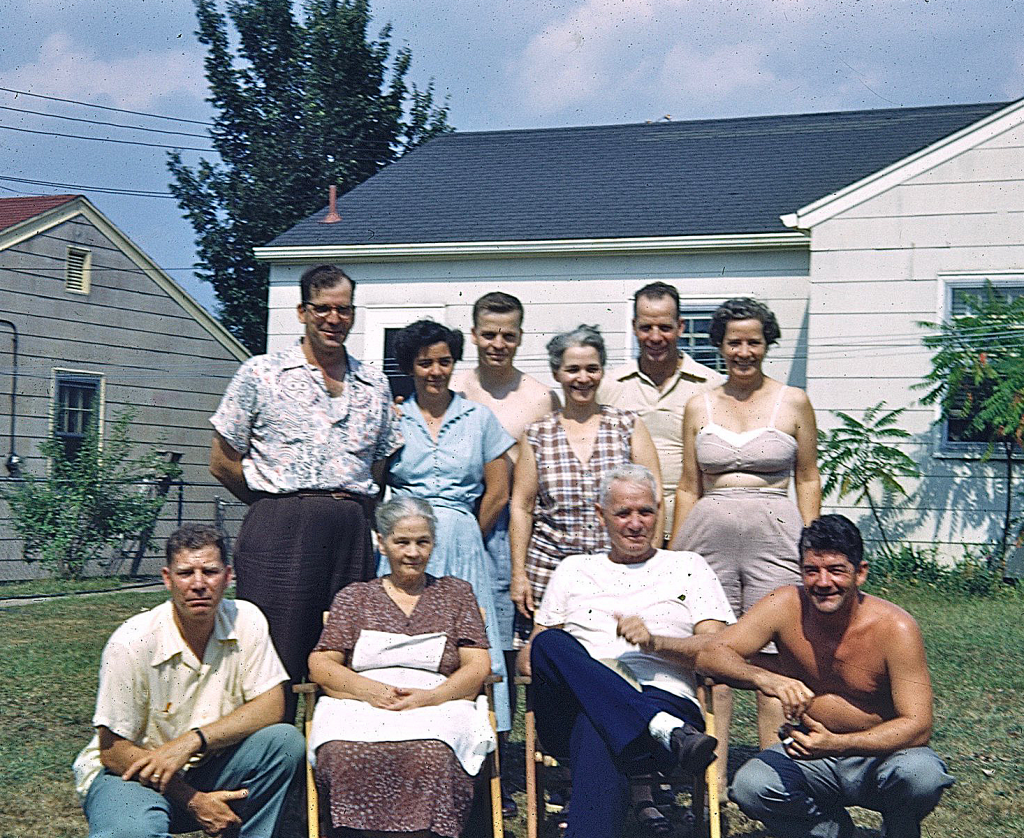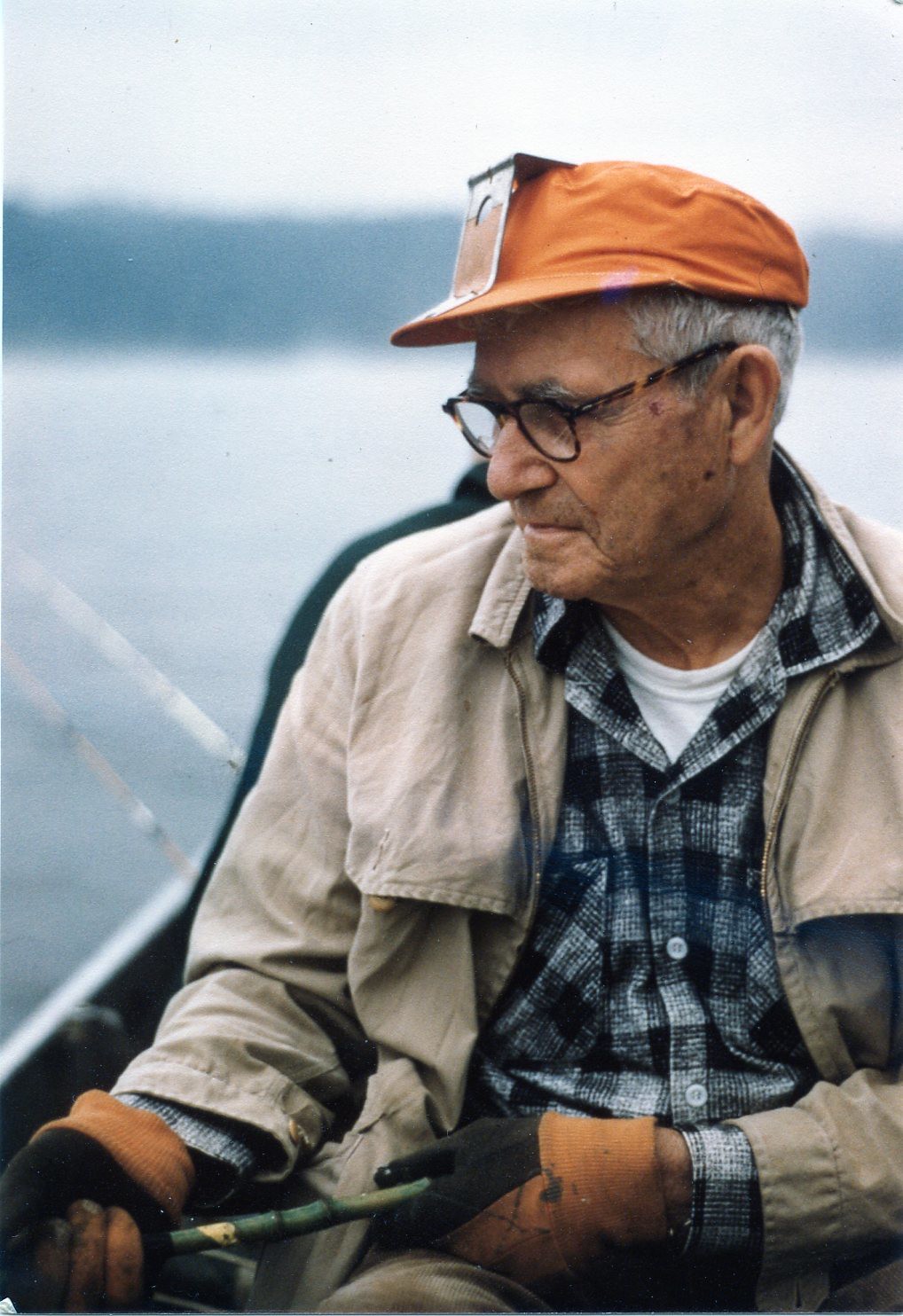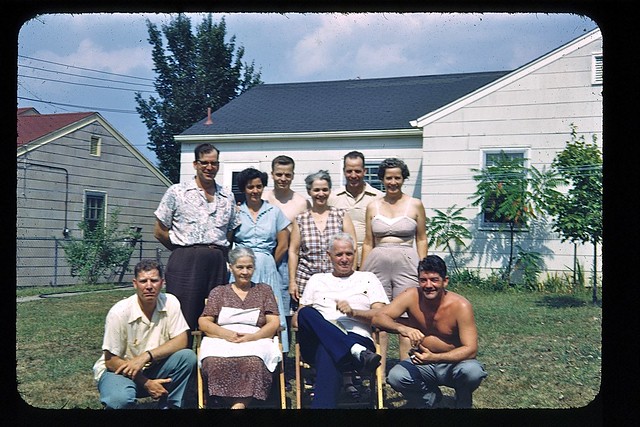“Granddad Hale” – 1883-1966

Henry Hale, my mother’s father, was born in Greenup County, KY in 1883, and died in 1966. Like Nanny Hale, he was a product of the Appalachian mountain culture: a tough person for tough times. He was a coal miner and farmer who, until his late sixties, never knew anything other than hard work.
He told me this story: at age 18, living in Kentucky, he hopped freight trains that brought him to Kanawha County, West Virginia. He jumped off the train and paid a man with a boat ten cents to take him across the river to the coal mining town of Diamond. He worked in the mines there for a year; then went back across the (Kanawha) river, hopped trains back to Kentucky, and married Effie — on Christmas Eve of 1903. They moved to West Virginia and their lives became a story of that day and place: coal mining, living in rural areas, and the rest. My descriptions of Nanny Hale are adequate to depict what life was like for Granddad. The rest of this entry I’ll devote to him.
Henry was what they called a “swarper.” That meant a man who wouldn’t back down; who was tough, rough, and ready to take on anyone who didn’t believe that. In addition to being a devoted husband and father, and a friend to hard labor and long hours, he was in every way a swarper. Although he didn’t spend time in the pool halls and bars, nor ever look for a confrontation, he was known as a man who wouldn’t back down. The story from my mother goes that his brother, Jim, who was also a swarper but less contained, had gotten too much to drink at the local tavern (very much like the western saloons of old), and had pulled his pistol and gone out onto the wooden sidewalk, just a roarin.’ They sent someone for Granddad and told him the problem. Granddad just walked out of the house, down to town — about two miles.
Then he walked up onto the wooden walkway where his brother Jim was shooting off his pistol in drunken joy, and simply poled him in the jaw. Jim went down like a dropped bear. That was the end of that. Henry didn’t look around for support or anger; he simply walked back home.
Knowing Granddad, I have every reason to believe that that is a true story. He was just that kind of man. Quiet, noncommittal, no nonsense. But that was just one side of the man.
Henry Hale was a father of six strapping boys. As in most families, they were all different. Prune, whose real name was Frank Curtis, was the eldest and destined to become a mine superintendent — the top of the line in that level of work. Pat, whose real name was Leslie Allen, the coal miner who was content to spend his time underground, digging out coal with pick and shovel, along with his brother Joe (Henry Joseph), the gentle giant, who, along with being a miner, loved animals above all else — and was likewise loved by his animals. Joe went on to become the master farrier in Raleigh County, shoeing horses for shows in Lexington, Kentucky and elsewhere.

Christy (his middle name was Mathewson, named for the famed baseball player), who was athletic, went to Beckley Junior College where he played basketball, and then moved to the Charleston area like the other relatives. He went to work at Carbide Carbon Chemicals, then at the beginning of World War ll, joined the Army Air Corps and was stationed in England until the end of the war. He went on to college in Oregon, and had a fine career as a professor of education at Eastern Montana University.

The eldest son, Orville, had drowned in a local pond while swimming with friends in 1923. He had just finished his junior year in high school, where we has a catcher for the baseball team. His death at 18 was a horrific blow to the family; they never got over it nor talked of it to later relatives.
Don, the youngest son and “baby” of the family: he was probably unexpected, and therefore the baby. You can imagine the attention he got from Nanny, the siblings and others. (Don was only three years older than I, and we became brothers under the skin in later years — we were truly brothers in the Indian sense. Although we never slashed our arms and joined ourselves in blood, Don and I became as fast — if not faster — than brothers in blood. We camped and fished together, shared stories and news of our families, listened to favorite country music, and the rest. While we were always separated by distance in miles, we stayed close until Don’s death in 2004.)
There were four daughters: Shelma “Littlely,” who died a toddler. Edith, who was an academic star, and who began teaching in the classroom at age 16 — upon her graduation from high school. And Frances — or “Rook,” as she was known to all — her name “Rook” being derived from her learning the “numbers” from a deck of cards of a game called “Rook.” And there was Audrey, my mother, about whom you will hopefully learn from her grandchildren. She was truly special.

But back to Henry: he loved to fish, and on occasion took his boys to camp on Indian Creek, an easy stream which flowed through Summers County into the great New River, a few miles upstream from Hinton, West Virginia. (At this point I direct the reader to my song, sung by me, called “Indian Creek.”)
Henry would take his boys — those who were around — and camp for a few days on the banks of Indian Creek. On one occasion, he took his son Don and my brother Dave, both of whom were much, much younger than the other Hale boys.
My brother Dave told me this story: Older Hale brothers Christy and Prune were very competitive. They had a bet on who could catch the largest bass. They were both in the creek, fishing. and Christy yelled, “I’ve hooked a big one. I need help!” And Prune said, “Hold on, I’ll be right there!” So Prune came to where Christy was holding a really large bass on a taut line, and said, “I’ve got him. Just keep the line tight!” Christy did, whereupon Prune came up on the stretched line, pulled his knife, and cut it. “Damn!” said Christy. “I just lost the biggest bass!”
“Well, I guess you did,” said Prune. “So, I guess I win.” That was the nature of the relationship among the Hale boys.
If it seems that I have more to report on Henry than other relatives, you’re right. That’s because I spent a lot more time with him. And I knew him better. Remember, my Granddad Farley died in 1945. Henry was around until 1966, a period which included many camping/ fishing trips, numerous visits to his new house. So my memories of him are much deeper.
Here’s more:
In 1956, I bought an MGA roadster. Look it up: 1956 MGA. It was a two-seat roadster from Britain, a true sports car. I would pick Granddad — Henry — up and we’d go somewhere to fish for the evening. At 6’5”, he would barely fit in the car. But no matter, if we were going fishing, that was fine. We did that fairly often — I’d guess that I took him fishing on local streams 30 or more times. Once, I took him to Winston-Salem to visit his son Don. That was a difficult trip. Henry could barely get into that MG, and his legs were too long for the area under the dash. But he never complained, and the trip was memorable for me if not for him.
Having known life at its most challenging, Henry Hale was wise in many ways. He had a sharp mind for ‘figures,’ and could do quick math calculations as they applied to everyday life. Somewhere, he acquired other knowledge — about general physics as it applied to leverage, weights, balance, and measurement. I never ceased to be amazed at his practical knowledge. How he came by it I never learned.
From the period 1956 until his death, Granddad and I were inseparable campers and fishermen. He would take time to give me old-time wisdom about fishing, camping and the woods and streams. Most of it was absolutely accurate. His son Don — my uncle — and I became true brothers. The three of us went camping in impossible situations. Granddad would direct us to campsites unknown to anyone else, mainly on Indian Creek. He would show us his woodsmanship, telling us how to look for bait, set up camp, the rest. His woods knowledge was deep. More importantly, he would regale us with stories about his childhood, about the Kentucky woods, and the rest. What an education that was.
On occasion, he would slip in a few words about life itself — in ways that didn’t impress until much later. He was a mostly-silent, easy-speaking Kentucky mountaineer who somehow knew about life and how to live it. His sense of humor encompassed all that he encountered: he could find humor in the simplest of situations — humor that bypassed most people. That dry, droll humor of the Kentucky-Tennessee mountains is unique in all the world. If you get a chance, find it.

I could tell you many stories about Henry Hale. But that is not the purpose of these writings. Perhaps, time permitting, I will write more completely about him. I hope I can. Henry Hale, more than any other relative, was the major joy of my life. He taught me in ways I’m still discovering. And he had a joy of living that anyone would envy. He worked hard as a coal miner and farmer. He worked hard at raising his family. He was absolutely devoted to Effie. He found humor where others would pass it by. He never gave up. He was physically a strong, strapping man, but more than that, he was a strong man among men who knew what to believe and how to stick to it. Among all the men I’ve known, he is the most admired. I was devastated when he died. Mostly because it never occurred to me what a powerful influence he had on my life. Perhaps even more than my own father, who had enormous influence on my life, and is not be discounted at all: in some instances, the bond between grandfathers and their grandsons reaches beyond the immediate family — even fathers, for grandfathers are not bound by parental obligation or expectations. That relationship can lead to a unique, relaxed freedom, and that was the case with Granddad Hale and me.


















